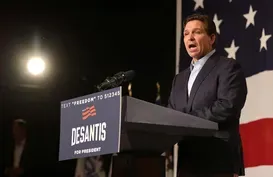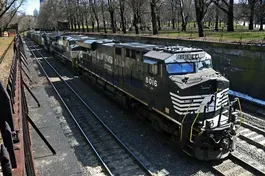
Bill to raise debt ceiling awaits final passage in Senate
Clip: 6/1/2023 | 7m 10sVideo has Closed Captions
Bill to raise federal debt ceiling awaits final passage in Senate
The deal to raise the federal debt ceiling is moving toward final passage in Congress. Pressure is on the Senate after the House approved the bill Wednesday night. It has to happen before the government's borrowing authority maxes out on Monday. Congressional Correspondent Lisa Desjardins reports.
Problems with Closed Captions? Closed Captioning Feedback
Problems with Closed Captions? Closed Captioning Feedback
Major corporate funding for the PBS News Hour is provided by BDO, BNSF, Consumer Cellular, American Cruise Lines, and Raymond James. Funding for the PBS NewsHour Weekend is provided by...

Bill to raise debt ceiling awaits final passage in Senate
Clip: 6/1/2023 | 7m 10sVideo has Closed Captions
The deal to raise the federal debt ceiling is moving toward final passage in Congress. Pressure is on the Senate after the House approved the bill Wednesday night. It has to happen before the government's borrowing authority maxes out on Monday. Congressional Correspondent Lisa Desjardins reports.
Problems with Closed Captions? Closed Captioning Feedback
How to Watch PBS News Hour
PBS News Hour is available to stream on pbs.org and the free PBS App, available on iPhone, Apple TV, Android TV, Android smartphones, Amazon Fire TV, Amazon Fire Tablet, Roku, Samsung Smart TV, and Vizio.
Providing Support for PBS.org
Learn Moreabout PBS online sponsorshipAMNA NAWAZ: Welcome to the "NewsHour."
The deal to raise the federal debt ceiling is moving tonight toward final passage in Congress.
Pressure on the Senate built today, after the House approved the bill last night.
GEOFF BENNETT: It has to happen before the government's borrowing authority maxes out on Monday.
That would trigger a national default.
Congressional correspondent Lisa Desjardins starts our coverage.
LISA DESJARDINS: The fate of the debt ceiling bill and the economy now lies in the Senate's hands.
SEN. CHUCK SCHUMER (D-NY): Time is a luxury the Senate does not have.
LISA DESJARDINS: This morning, Majority Leader Chuck Schumer urged quick action to avoid default.
SEN. CHUCK SCHUMER: June 5 is less than four days away.
At this point, any needless delay or any last-minute holdups would be an unnecessary and even dangerous risk.
MAN: Yeas are 314.
The nays are 117.
The bill is passed.
LISA DESJARDINS: The measure has big momentum after overwhelming bipartisan passage in the House last night.
Majorities of both parties backed the bill.
The nonpartisan Congressional Budget Office says the legislation will cut the deficit $1.5 trillion over the next decade.
It also includes concrete spending limits for two years, new work requirements for older people on food stamps, with exemptions for some others, a restart of student loan payments, and a shorter timeline for environmental reviews of big projects.
House Speaker Kevin McCarthy took a victory lap with the GOP team of negotiators.
REP. KEVIN MCCARTHY (R-CA): This is fabulous.
This is one of the best nights I have been here.
I thought it would be hard.
I thought it would be almost impossible just to get to 218.
Now I found there's a whole new day here.
SEN. RICHARD DURBIN (D-IL): Now it's our turn in the Senate.
LISA DESJARDINS: Both Republican and Democratic senators also backed the bill, adding to a sense that it will pass.
SEN. RICHARD DURBIN: As painful as some of the decisions that will come from this agreement reach, they are virtually at this point inevitable to avoid default on our debt.
SEN. SHELLEY MOORE CAPITO (R-WV): I want to commend Speaker McCarthy for negotiating a legislation that makes responsible reductions in government spending, while avoiding a government default.
LISA DESJARDINS: But some opposing senators are standing in the way of a fast process, asking for amendment votes first.
Kentucky Republican Rand Paul's would cut more spending.
SEN. RAND PAUL (R-KY): The Biden-McCarthy deal is not conservative in any way, shape, or form.
It doesn't reduce spending.
It allows spending to continue to increase.
LISA DESJARDINS: Some progressive Democrats say the bill cut too much, hurting the vulnerable.
Another issue, the bill would fast-track the contentious 303-mile Mountain Valley Pipeline supported by West Virginia lawmakers.
Virginia Senator Tim Kaine wants a vote on that.
SEN. TIM KAINE (D-VA): For a private company to build a pipeline, they have to get approval that its necessary and the route is good.
But then, once that, they're entitled to take people's land.
In Appalachia, Virginia, it's the hardest-hit part of my state.
People don't have a lot.
Sometimes, land is all that they have.
LISA DESJARDINS: The bill needs at least 60 votes, and appears to have it.
With a ticking debt clock, the question is when that vote happens.
GEOFF BENNETT: And, Lisa, you have been covering all of this from one side of the Capitol to the other for months now.
Where do things stand right now?
LISA DESJARDINS: Feels like years, but it's only been a few months.
We have news at this moment.
Senators have been trying to negotiate that critical time agreement to make sure they can make the deadline for this vote.
And we're told by our producer Kyle Midura, who is there at the Capitol right now, that, in fact, we expect votes now in the next one half-hour.
This is the Senate floor.
Currently, you see Virginia Senator Tim Kaine there in the chair.
Looks like nothing's going to happen.
But this is exactly that moment that I tell voters about when rainbows appear in the Senate.
(LAUGHTER) LISA DESJARDINS: And I think what we will have is a late night.
The Senate probably will complete this tonight or in the early hours to morning.
Two things you and I know about the Senate, one, each senator represents a state.
Two, they don't meet on Fridays.
GEOFF BENNETT: That's right.
LISA DESJARDINS: Many of them already have their flights home.
This could be wrapped up tonight or in the early morning hours.
GEOFF BENNETT: Let's talk about the bill because Speaker McCarthy has said that this would save $2 trillion.
You have been looking into this.
Does that math add up?
LISA DESJARDINS: I'm sure our viewers have heard that $2.1 trillion figure.
It is sort of a -- kind of idea that, if you squint your eyes and look at it, you can get to $2.1 trillion by including the suggested spending caps that are not required, but that are essentially suggested in future years.
But if you look at just what the bill requires, it is only a $1.5 trillion cut.
I will say also that important in the Senate negotiations is the next step for appropriations.
Some Senate Republicans have been trying to make back deals today to make sure that appropriations bills pass and also that there's money for the military, maybe in a separate funding bill from this deal.
GEOFF BENNETT: Big picture, what has this protracted debate about the debt ceiling shown us about the parties?
LISA DESJARDINS: Right.
We have been spending so much time on the nitty-gritty, the votes, the details, the dollars, but I think there are some really important moments here.
Number one, this is one of the first times that we have seen the House taking the lead on anything.
Senators are uncomfortably feeling the House forcing them to act today.
But, with that, when you look at the House Republican leadership and the Republicans in general, this is the first time that I can remember seeing Republicans in the last four years move toward the center.
And they did it en masse.
Until now, we have experienced that dynamic where someone is very far on the right, and the rest of the conference feels like they have to go as far right as possible.
Instead, what we have seen here is Republicans go toward the middle, also an example of regular process.
GEOFF BENNETT: Could that happen again, though?
LISA DESJARDINS: Oh, completely.
GEOFF BENNETT: I mean, what does that suggest about legislation moving forward?
Has the far right lost their pull?
LISA DESJARDINS: I think that there was an issue here with a catastrophic potential consequence.
There was also an novel factor that President Trump, the former president, was not really involved here.
And I think you see his pull, whenever he rings in, is still strong with House Republicans.
So if he gets involved, then that does matter.
I asked Senator -- Speaker McCarthy last night, hey, you guys rolled up your sleeves.
You did what the country wanted.
That's the other lesson here.
People want compromise.
They figured it out.
I said, hey, could you use this template for other things like immigration?
He actually didn't really answer that question.
And I took it as kind of a no, but there is some hope there.
The problem, of course, what really mattered here was that deadline, the catastrophic potential default, and that got them to act.
GEOFF BENNETT: So what about the Democrats, then?
What did you learn about the Democrats from this experience?
LISA DESJARDINS: You know, I think, in the end, the Democrats, they will tell you, especially if this passes, they feel like they got the better deal.
Shalanda Young, the OMB director, is universally cited as one of the smartest people involved in this whole thing.
And I think Democrats feel like they did better in the end than Republicans did, especially with future triggers.
They feel a lot of the different changes in here have many out clauses and waivers that they think the government can get around.
GEOFF BENNETT: So we will be back here in two years talking about the next effort to lift the debt ceiling.
LISA DESJARDINS: Bad news.
We will be back here this summer when they start talking about how to divvy up this funding.
GEOFF BENNETT: Wow.
OK. All right.
Lisa Desjardins, always great to see you.
Thanks so much.
LISA DESJARDINS: Thank you.
Cassette tapes make comeback in era of music streaming
Video has Closed Captions
Clip: 6/1/2023 | 6m 22s | Cassette tapes make unexpected comeback in era of music streaming (6m 22s)
GOP presidential candidates hit key states as race heats up
Video has Closed Captions
Clip: 6/1/2023 | 11m 8s | Republican presidential candidates travel to key states as 2024 race heats up (11m 8s)
Imran Khan discusses government crackdown on his party
Video has Closed Captions
Clip: 6/1/2023 | 8m 13s | Pakistan's ousted Prime Minister Imran Khan discusses government crackdown on his party (8m 13s)
Long trains cause problems for communities near crossings
Video has Closed Captions
Clip: 6/1/2023 | 6m 57s | Miles-long freight trains cause problems for communities near railroad crossings (6m 57s)
Report: Prosecutors have audio of Trump discussing documents
Video has Closed Captions
Clip: 6/1/2023 | 6m 45s | Prosecutors have audio of Trump discussing classified documents he kept, reports say (6m 45s)
Providing Support for PBS.org
Learn Moreabout PBS online sponsorshipSupport for PBS provided by:
Major corporate funding for the PBS News Hour is provided by BDO, BNSF, Consumer Cellular, American Cruise Lines, and Raymond James. Funding for the PBS NewsHour Weekend is provided by...














